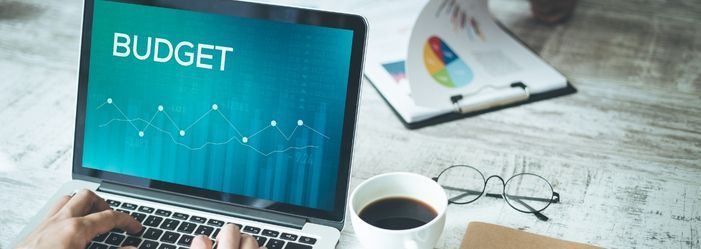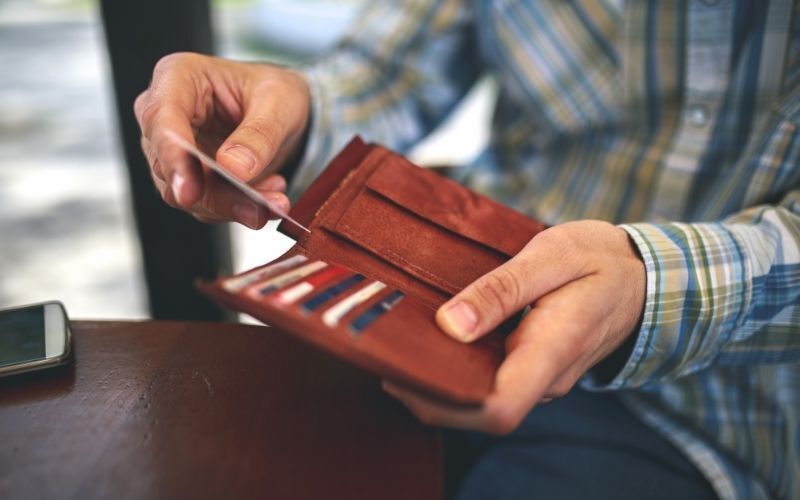Last Updated: April 5, 2024
How to Choose the Right Payment Type for Your Needs

Disclaimer: We are not qualified legal or tax professionals and are not giving advice. Always speak with a qualified professional before making any legal or financial decisions.
In today's digital age, managing your finances wisely is more crucial than ever, especially when trying to adhere to a budget. With a plethora of payment options at your fingertips, from the traditional cash and checks to modern debit cards, credit cards, and even mobile payment solutions, choosing the right one can significantly impact your budgeting success.
This guide dives into the advantages and drawbacks of each payment type to help you make informed decisions that align with your financial goals, ensuring you stay on track and avoid the pitfalls of overspending. Let's explore the most effective payment methods for maintaining a healthy budget.
Eager to talk now? Skip the article and secure a free consultation with a debt specialist.
Debit cards - they are linked directly to your bank account and can be used anywhere Visa is accepted.
Debit cards are great for people who are on a budget because they help you to stay accountable for your spending. When you use a debit card, the money comes right out of your checking account, so you can see exactly how much money you have left to spend. This can help you to stay within your budget and avoid going into debt.
The main advantage of using a debit card is that you can avoid accruing debt. However, one downside is that if you overspend, it can cause your account to become overdrawn which can result in fees.For more strategies on managing your finances, learn about envelope budgeting, a method that complements the use of debit cards by helping you allocate funds for specific expenses. If you're considering relocating or want to know where you can maximize your budget, check out these cities where comfort and affordability meet.
There are pros and cons to using debit cards when you're on a budget.
The biggest pro is that debit cards are linked directly with your checking account, so you can't spend more money than you have. This can be a great way to keep your spending in check and make sure you're not overspending each month.
Another pro is that many debit cards offer rewards programs, which can give you cashback, points, or other perks for using your card. This can be a helpful way to save money on the things you purchase already.
The main con of using debit cards is that if something happens and you don't have the funds in your account to cover the purchase, the bank may charge you fees.
Additionally, if your card is lost or stolen, it can be difficult to get your money back quickly.
Overall, debit cards can be a great way to stick to a budget and still earn rewards on your spending. Just be sure to keep an eye on your account balance and watch for fees.
Credit cards - they have a higher limit, but you need to be careful not to overspend
If you're on a budget, using a credit card can be helpful because it allows you to spread your spending out over time. This can make it easier to afford larger purchases and can help you avoid racking up debt.
That said, it's important to be careful with credit cards and to make sure that you're always paying your bill in full and on time. Otherwise, you could end up paying interest charges that will end up costing you more money in the long run.
- Only use credit cards for purchases that you can afford to pay off in full each month. This will help keep your debt levels low and avoid paying interest.
- Make sure you have a plan for how you will pay off your credit card balance each month. This could mean setting aside money from each paycheck or creating a budget that allows you to make larger payments towards your balance each month.
- Compare rates and terms between different credit cards so that you can find one that fits your budget and needs.
- If you are having trouble sticking to a budget, consider using a debit card instead of a credit card. This will help you avoid overspending and keep your finances in check.
- Whatever payment method you choose, be sure to stay mindful of your spending and always try to live within your means. By doing so, you can avoid getting into debt and stay on track to reaching your financial goals.
Prepaid debit cards - these work like regular debit cards, but the funds are preloaded so you can't go over budget
Prepaid debit cards are a great way to stay on budget because you can only spend the amount of money that you have loaded onto the card. This prevents you from overspending and going into debt.
There are many different prepaid debit cards available, so be sure to compare the fees and features of each card before selecting one. Some cards have no monthly fees, while others may have a monthly fee plus a reload fee.
Also, be sure to check whether the card issuer charges a fee for ATM withdrawals.
Here are four tips for using prepaid debit cards to help you stay on budget:
- Match the prepaid card with your spending style. Some prepaid cards have restrictions on where you can use them, while others have no restrictions. Choose the card that best fits your spending style.
- Stick to your budget. Use the prepaid card as intended—to stick to your budgeted amount each month.
- Use it for emergencies only. Don't rely on the prepaid card for everyday expenses; use it for emergencies only so you don't get too far into debt.
- Check the fees. Some prepaid cards have high fees, so be sure to compare the fees of different cards before you choose one.
Overall, prepaid debit cards are a great way to manage your finances and stay on budget. Use them wisely, and you can avoid debt and enjoy the convenience of plastic.
Cash - it's easy to lose track of how much money you're spending when you use cash, so only use it for small purchases
Cash is always a useful tool when you're sticking to a budget. For one, it's physical proof that you're sticking to your spending limits. And if you have cash on hand, you won't be as tempted to overspend or buy things you don't need.
Another advantage of using cash is that it helps you "feel" the money going out of your wallet more acutely than if you were using a debit or credit card. When we use plastic instead of cash, it's easy to lose track of how much we're spending and how much we actually have in our bank accounts.
That said, there are some disadvantages to using cash too. For one, it can be easy to forget about how much money you have in your wallet, which can lead to overspending. And if you're not careful, cash can also be a target for thieves.
So which payment type is best if you're trying to stick to a budget? It depends on your personal preferences and habits.
Learn more about how to budget from reading Cut These 8 Things From Your Budget For Significant Savings
Checks - they take longer to process than other payment types, but you can earn rewards on some check-out programs
Using checks can be a good way to stick to a budget, but only if you use them correctly. When you use checks, make sure to record the transactions in your budgeting software or in a physical notebook so that you can track your progress. In addition, make sure to have enough money in your checking account to cover the checks that you write.
There are a few things to consider when deciding if checks are a good option for sticking to a budget. Checks can be costly if you have a lot of bounced checks or overdraft fees, and they also take time to process and can be slow to show up in your account.
However, checks can be helpful for budgeting because they help you keep track of what you're spending and where. They're also great for putting money aside for specific purposes, like saving up for a vacation or buying Christmas gifts.
Checks can also be helpful when paying bills or other large expenses, as you can break the payment into smaller chunks that are more manageable.
The Pros and Cons of Cash for Budgeting
Cash can be an effective budgeting tool but also has some downsides to consider.
The Pros:
- Tangible - you can visually see how much you have left to spend
- Avoids overspending - limits purchases to what you have on hand
- No fees or interest - cash has no extra costs (besides ATM fees)
The Cons:
- Security risk - cash can be lost or stolen
- Harder to track - no paper trail like you have with cards
- Not accepted everywhere - some places only take cards
Finding the Right Payment Mix
The most effective budgeting strategy often involves a mix of payment types based on your spending habits and financial goals.
- Use cash for discretionary purchases like dining out, entertainment, etc. This provides tangible control over spending. Limit cash to small purchases to avoid overspending entire wallet contents.
- Use a debit card for essential expenses like groceries, gas, bills, etc. The money comes directly out of your checking account, so you can track spending while avoiding debt. But watch out for overdraft fees if balances run low.
- Consider a prepaid card for vacations or other large purchases where you want to set a strict spending limit. Load the card with only the amount you want to spend.
- Use credit cards sparingly and only for amounts you can pay off monthly. Reserve for emergencies and benefits like rewards or cash back. Avoid carrying balances and interest charges.
- Automate bill payments for fixed expenses whenever possible. This saves time and avoids late fees. Just monitor your account balance to prevent overdrafts.
Experiment to find the right mix for your financial personality. Track spending to see which methods provide the most control. Be willing to adjust your payment methods over time as your budgeting skills improve.
Automate Bill Payments
Set up automatic payments through your bank for bills with fixed monthly amounts. This ensures bills are paid on time while removing the hassle of manually making payments. Just be sure to monitor your account balance closely to avoid overdrafts from autopayments.
Budgeting Tools and Tips

Implementing budgeting tools and tips can make sticking to your financial plan easier:
- Use budget spreadsheets or apps to break down income and expenses. Seeing your full financial picture makes it easier to plan spending.
- Enable notifications on bank accounts and credit cards. These alerts inform you when balances get low or charges are made, allowing you to stay on top of your money.
- Implement the 50/30/20 budget where 50% of income covers needs, 30% goes to wants, and 20% goes to savings and debt. This splits spending into essentials vs. non-essentials.
- Set up separate checking accounts or budgets for different financial goals like an emergency fund, vacation, car purchase, etc. This lets you earmark funds for specific purposes.
- Build rewards and accountability into your budget. Reward yourself when you stick to your plan. But also impose consequences like limiting spending in other areas if you overspend.
- Review your budget frequently and make changes if needed. Your financial situation may evolve, so be willing to adapt your budget strategy over time.
FAQs
Conclusion
Debit cards are best for sticking to a budget because they allow you to spend only the money that is in your account. Credit cards can be helpful if you need to build your credit score but make sure you can pay off your balance each month so you don’t incur interest charges.
Prepaid debit cards can also be helpful if you want more control over your spending, and they often have lower fees than traditional checking accounts. Cash should only be used as a last resort because it can be difficult to keep track of how much money you have left.
The key is being willing to try different budgeting methods, track their effectiveness, and make ongoing adjustments. Pay close attention to your behaviors and spending tendencies. With time and discipline, you can find a winning payment formula to keep your budget on track and achieve your financial goals.
If you are struggling with overwhelming debt and want to explore your debt relief options, Pacific Debt Relief offers a free consultation to assess your financial situation. Our debt specialists can provide objective guidance relevant information and support to help find the right debt relief solution.
*Disclaimer: Pacific Debt Relief explicitly states that it is not a credit repair organization, and its program does not aim to improve individuals' credit scores. The information provided here is intended solely for educational purposes, aiding consumers in making informed decisions regarding credit and debt matters. The content does not constitute legal or financial advice. Pacific Debt Relief strongly advises individuals to seek the counsel of qualified professionals before undertaking any legal or financial actions.
✔ Accredited by Better Business Bureau with BBB A+ rating (4.92 rating and 1,700+ reviews)
✔ 7.5 star rating by BestCompany.com (over 2300+ client reviews)
✔ 4.8 star rating by TrustPilot (over 2200+ verified consumer reviews)
✔ ConsumerAffairs.com Accredited (over 500+ verified reviews with an average rating of 5 stars)
✔ A Top 10 Rated Compan by TopTenReviews.com , ConsumersAdvocate.com and Top10debtconsolidation.com
✔ 4.6 star rating by Google (400+ client reviews)
✔ 100% rating by SuperMoney (8 client reviews)
Reduce Your Credit Card Debt By Up to Half

BBB Reviews | 4.9/5.0 Rating









 Do Not Sell My Personal Information
Do Not Sell My Personal Information